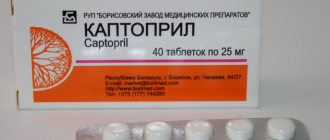Captopril is a drug from the group of ATP inhibitors, which was created back in 1973. Until now, it has been successfully used by patients with signs of hypertension and heart disease. Often, hypertensive patients ask doctors questions at what pressure to take Captopril, what are the advantages of this drug over other antihypertensive drugs, how effective are the tablets and whether they can provide emergency help with high blood pressure. Therefore, today we will talk about the drug Captopril, we will talk about its use, indications, side effects and other nuances of treating hypertension with this drug.
When should you take Captopril?
Captopril tablets for high blood pressure are taken on the recommendation of the attending physician, who also selects the required dosage and frequency of use of the drug. According to the instructions for use, the use of Captopril is justified not only for the treatment of hypertension, but also for other concomitant diseases:
- high blood pressure and hypertension, including those forms that cannot be treated with other types of medications;
- chronic hypertension, aggravated by regular surges in blood pressure, heart failure and angina pectoris;
- pathologies associated with impaired renal vascular function;
- ambulance for relief of hypertensive crisis;
- renoparenchymal hypertension due to recent or chronic glomerulonephritis;
- bronchial asthma, accompanied by a regular increase in blood pressure;
- renal vascular pathologies resulting from diabetes mellitus;
- chronic heart failure that cannot be treated with cardiac glycosides and diuretics;
- Conn's syndrome.
Many patients take Captopril for high blood pressure only when there are sudden changes and signs of a hypertensive crisis, which is fundamentally wrong. Hypertension should be treated systematically, combining medications prescribed by the doctor with moderate physical activity, diet and physiotherapy.
As a result, such patients belong to the group of people who independently increase the risk of developing strokes, myocardial infarction and shorten their own lives by several years
Hypertension
Few people in our time have not heard anything about hypertension, or high blood pressure. This is not surprising - after all, in the modern world, every third adult is faced with this problem and is forced to look for ways to solve it.
Blood pressure is considered elevated if its value is 140/90 mmHg. Art. or higher, regardless of the person's age. Most often, high blood pressure is an independent disease called hypertension. But sometimes hypertension is a symptom of some other disease (for example, kidney disease, thyroid disease, adrenal gland disease). In this case, in addition to reducing the numbers, the underlying disease must be treated.
Advantages of the drug
Why is the drug Captopril considered very effective for the treatment of hypertension and heart failure? This is explained by a number of undeniable advantages over similar drugs:
- according to studies, the mortality rate from diseases of the cardiovascular system with regular use of Captopril is significantly reduced;
- the drug lowers blood pressure as effectively as other drugs from the main classes intended to relieve symptoms of hypertension;
- does not pose a danger to elderly patients;
- slows down the development of symptoms of kidney diseases, even those arising against the background of diabetes mellitus;
- does not reduce erectile function in men;
- acts on the body as a whole, providing an antioxidant effect on tissues and blood vessels;
- reduces the risk of malignant tumors many times more effectively than other classes of medications.
In addition to the listed advantages of using Captopril in the treatment of hypertension, the drug is affordable, in contrast to analogues and products with a similar chemical composition. Therefore, patients and doctors have long considered Captopril to be the gold standard in the treatment of hypertension, high blood pressure and pathologies of the cardiovascular system.
Analogs
The drug Captopril is produced by many pharmaceutical companies. All these drugs are analogues, identical in their composition and therapeutic effect. Let's look at some of them:
- Captopril-STI is produced by the Russian company ABVA RUS, OJSC. The main active ingredient is captopril. It is used for all types of arterial hypertension.
- Captopril-Acos is an antihypertensive drug containing captopril. The instructions for use of Captopril-Acos indicate Russia. Like other ACE inhibitors, it is used to lower blood pressure in patients with various conditions.
- Captopril Sandoz - produced in Slovenia by the company SANDOZ dd, is a complete analogue of Captopril.
- Kaptopres - antihypertensive tablets from Ukrainian. The drug contains captopril and hydrochlorothiazide. The drug is used for short-term and long-term treatment of diseases accompanied by an increase in A.
- Blockordil is another medication classified as an ACE inhibitor. Blockordil is produced by the Slovenian company KRKA.
It is impossible to say for sure which manufacturer is better to buy tablets from. When choosing a drug, you should be guided by personal preferences, characteristics of the course of the disease and the individual qualities of the body.
At what pressure will the drug be effective?
Captopril for blood pressure has an effect on ACE (angiotensin-converting enzyme), which affects the tone of blood vessels, narrowing them and causing an increase in blood pressure. As a result, the capillary walls maintain normal tone, do not contract and do not slow down blood circulation. With constant use of the medicine, you can reduce blood pressure to normal levels and maintain it within acceptable limits.
Captopril quickly reduces blood pressure, improving blood supply to the heart, relaxing its capillaries and reducing the load on the myocardium. At the same time, the heart muscle retains its full ability to pump a sufficient amount of blood into the circulatory system. Patients who take Captopril after a heart attack are able to withstand physical stress and emotional stress because their heart muscle becomes more resilient.
It is important to reduce blood pressure gradually
At what pressure should you take the tablets so that they have the maximum therapeutic effect? Captopril is usually prescribed to patients diagnosed with the first and second stages of hypertension, when blood pressure levels rise to 179/109. This condition does not require additional therapy and can be easily treated with the prescribed dose of tablets. Severe hypertension, in which the pressure rises above 180/110, requires the use of the drug together with diuretics, since in such situations Captopril does not reduce the pressure to normal levels alone.
Reception scheme
The effect of using Captopril directly depends on the prescribed regimen; it is necessary to take the tablets correctly in order to achieve the maximum therapeutic effect. According to the instructions from the manufacturers of the drug, patients with chronic heart failure need to take Captopril 6.25 mg up to three times a day. After 10–14 days, the dosage can be gradually increased.
After the first dose of the medicine has been taken, the patient needs to monitor blood pressure levels, measuring it every half hour for 2.5–3 hours to assess the effect of the tablets on the body. The average dosage for people with heart problems is 25 mg three times a day. To lower blood pressure, patients with hypertension need to take Captopril 12.5 mg in three doses or 25 mg twice a day.
The doctor can prescribe the best dose and frequency of administration after an examination. The maximum dose of the drug that a hypertensive patient can take during the day is 150 mg, divided into three doses (50 mg at a time). If a patient takes an increased dose of medication as an emergency treatment for a jump in blood pressure, this will not give the desired effect, but will only increase the risk of side effects. Patients with kidney disease are recommended to take the drug up to 75–100 mg per day; if necessary, the doctor uses loop diuretics.
In this case, treatment begins with an initial dosage of 6.25 mg three times a day, then, monitoring intermediate test results, the dosage is gradually increased.
How quickly does the drug work?
How long does it take for Captopril to work, patients with regular surges in blood pressure ask. The drug is characterized by good absorption into the blood serum, and the peak of action begins 15–60 minutes after administration. If a patient has just eaten and then taken a Captopril tablet, this can reduce the effectiveness of the drug by up to 40%. Therefore, doctors recommend taking the medication 1.5 hours after eating.
Also, many hypertensive patients are interested in whether to drink Captopril with water, or would it be more correct to put it under the tongue? There have been no special studies on this matter, so it is impossible to say that one of these methods of using tablets is correct and the other is not. You should try both options, after taking it, monitoring your blood pressure level using a tonometer and focusing on your own sensations. For some patients, resorption of Captopril under the tongue brings a greater effect than oral administration, while for others it is more common to take tablets with water.
Pharmacokinetics
Absorption of the tablets after they enter the gastrointestinal tract occurs quite quickly. When taken on an empty stomach, absorption is 75%. This figure decreases if you take the medicine immediately after meals (no more than 45%). Communication with blood proteins is up to 30%, the maximum concentration of the active component in plasma is observed after 60–90 minutes. Metabolism occurs in the liver.
The drug is excreted primarily by the kidneys. Up to 50% unchanged, the remainder in the form of metabolites. The half-life lasts 3 hours and increases significantly with renal failure and other organ pathologies.
Contraindications
How to take Captopril for high blood pressure so that the treatment is effective and safe? First of all, it is necessary to take into account the list of contraindications.
These include:
- pregnancy, lactation and breastfeeding;
- renal artery stenosis diagnosed on both sides;
- stenosis of the renal artery, if this organ functions alone;
- an increase in blood levels of nitrogenous products excreted by the kidneys;
- liver diseases;
- low blood pressure;
- individual intolerance and allergic reactions to drugs from the group of ACE inhibitors.
Particular attention to well-being after taking Captopril should be paid to patients with infectious diseases, for example, systemic lupus erythematosus
During the first 21 days after treatment of the disease, the number of leukocytes in the blood serum of such patients is increased, so when taking the drug they need to monitor their blood count twice a month, and after that - once every 60 days. If there are signs of infectious diseases while taking Captopril, the patient should consult a doctor.
You cannot stop taking the medication yourself, without stopping it from your doctor, as well as change the dose and frequency of use recommended by the doctor.
What should I do if I experience vomiting, diarrhea, and increased sweating while taking the medication? Urgently call an ambulance or visit a doctor, as excessive sweating provokes a state of severe hypotension. With a sharp decrease in blood pressure in hypertensive patients, the risk of myocardial infarction increases significantly.
special instructions
Taking the drug during pregnancy is excluded during the 2nd and 3rd trimester and is undesirable at the initial stage. Therefore, on the eve of planning or immediately after pregnancy is detected, you should switch to other medications in consultation with your doctor. During breastfeeding, the use of the product is completely excluded.
During therapy with Captopril, the ability to drive a car, as well as certain types of activities, may decrease. The onset of such effects depends on the dosage and individual characteristics of the body.
Overdose and side effects
Nausea and vomiting are the first signs of an overdose of pills. If you arbitrarily exceed the dose of the drug, Captopril can provoke the development of side effects:
- From the cardiac side - hypotension, increased heart rate, swelling of the skin of the lower extremities, a sharp drop in blood pressure when the patient assumes a vertical position (orthostatic hypotension).
- From the gastrointestinal tract - impaired taste perception, nausea and vomiting, diarrhea (rarely), dryness and inflammation of the mucous epithelium of the oropharynx, pain in the epigastrium, increased levels of liver enzymes, bilirubin, up to the development of hepatitis.
- From the kidneys - excretion of large amounts of protein, urea and creatinine in the urine.
- From the hematopoietic system - a decrease in the number of platelets, granulocytes, neutrophils in the blood serum, anemia.
- From the nervous and respiratory systems - dry cough, bronchospasm, pulmonary edema, poor coordination in space, headaches, flashing “flies” before the eyes, drowsiness and lethargy.
Captopril should not be taken simultaneously with potassium-containing drugs, since the level of potassium in the blood will be excessively high, the same can be said about drugs containing lithium. Non-steroidal anti-inflammatory drugs, in particular Indomethacin, products containing estrogen and Clonidine, reduce the effectiveness of the drug.
Antihypertensive drugs should be taken with caution, only after the recommendation of a doctor. The dosage and frequency of administration should not be changed independently, especially upward. If a patient believes that increasing the dose prescribed by the doctor will help him quickly stop the signs of increased blood pressure, then he is mistaken. Such tactics can only provoke the development of side effects, often life-threatening.
Drug interactions
Vasodilators and some diuretics enhance the hypotensive effect of Captopril.
Indomethacin and other non-steroidal anti-inflammatory drugs may inhibit the effect of the tablets in question.
The therapeutic effect of the drug in combination with estrogens is reduced.
Clonidine helps reduce the effect of Captopril.
The combined use of an antihypertensive drug with potassium-sparing diuretics often leads to the development of hyperkalemia.
During therapy, the choice of medications is made exclusively by the doctor
Due to the combination of Captopril with certain antidepressants, hematological disorders were recorded in some patients.
In combination with gold drugs, antihypertensive tablets lead to side effects such as nausea, severe decrease in blood pressure, vomiting, and hyperemia.
The risk of hypoglycemia occurs when Captopril is combined with hypoglycemic drugs.









